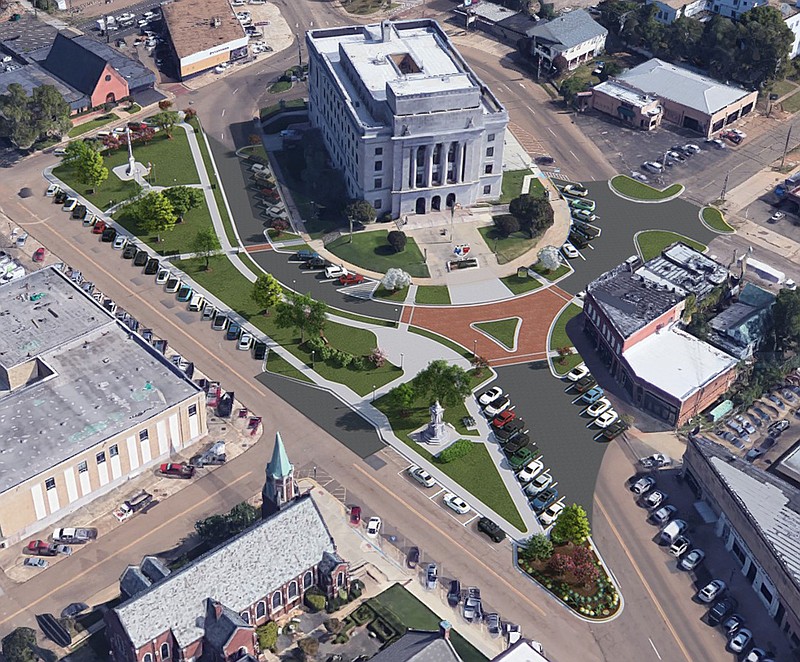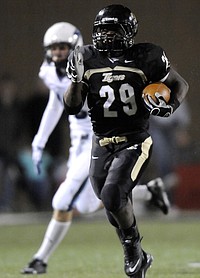TEXARKANA - An idea called Strategic Doing is moving through local leadership circles, driving multiple initiatives and projects including the downtown Courthouse Square renovation about to get under way.
Championed by civic group Leadership Texarkana and officials such as Texas-side Assistant City Manager David Orr, Strategic Doing - or SD - focuses on accomplishing goals through individual initiative and incremental concrete action, as opposed to top-down steering and abstract plans. Proponents say the method's main advantage is that it works.
"The whole focus is on doing. If you're willing to do, you're welcome at the table," said Ruth Ellen Whitt, Leadership Texarkana's executive director. Whitt is a certified SD practitioner who trained in the method in 2018 at Purdue University and has been promoting it since.
"Strategic Doing's unique approach helps groups come together, and within the time frame of a workshop, begin to align toward shared outcomes; the process guides group members to identify opportunities where they can link and leverage existing assets to move forward," according to a summary.
Participants begin by posing a framing question that invites them to imagine an outcome. Then each commits to bringing their personal assets, talents and resources to bear one small step at a time, on their own initiative with no need to ask permission.
The result is a different way of thinking and doing, emphasizing networks over hierarchies and "small bites" over heroic efforts, Whitt said.
Orr credits an SD team with bringing the Courthouse Square project to fruition. The $950,000-plus project will beautify the grounds of the downtown federal courthouse and post office, as well as improving safety for drivers and pedestrians.
"Strategic Doing was the force that helped this project cross the goal line. We've been planning and working on this project for over five years now. The website, design changes, landscape plan and coordination with the Federal Courthouse judges were all Strategic Doing group deliverables.
"We have an awesome SD team made up engineers, landscape architects, marketing experts, real estate gurus, a physician, business people and city staff members from both sides of the line," Orr said in an email. "They were instrumental in making this project a reality and it could not have been done without them."
The Courthouse Square SD team met virtually throughout the spring and summer and will continue with check-ins every two months, he said.
Proponents cite initiatives at NASA, helping solve problems associated with sending people to Mars, and New Mexico State University, building collaborations along the U.S.-Mexico border, among many other examples of SD at work.
SD's history began in the 1990s in Oklahoma City, when a consultant named Ed Morrison began to apply his study of open source software development to questions of collaboration, "through a loosely coupled network of individuals working together to complete complex projects in an environment when nobody can tell anybody else what to do," according to strategicdoing.net.
In January, Morrison helped facilitate a Leadership Texarkana workshop centered on the framing questions, "Imagine Texarkana was a magnet for talent and entrepreneurs for the region. What would that be like? What could we do? What should we do? What will we do? What's going to happen in the coming 30 days?"
Follow-up workshops and further training were planned for the spring, but the coronavirus pandemic prevented them. Still, SD has become a cornerstone of Leadership Texarkana training, the first thing taught to participants in the group's development retreats.
The idea has spread. Whitt estimates that more than 100 groups are using SD in a variety of local contexts, including the city's colleges and universities, industrial hub TexAmericas Center and economic development group AR-TX REDI.
"SD is a proven process - it works. For Texarkana to get best outcomes, and move forward in areas where we have spun wheels, we need to not do what we have always done; we need to do something different to get different outcomes. This is that something," Whitt said. "If we can grow it - open source, in our community, so that it is our way of doing business, critical masses of individuals know it and use it - it will benefit all who live and work here."


